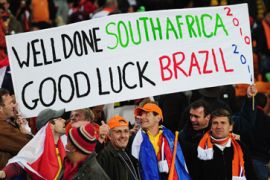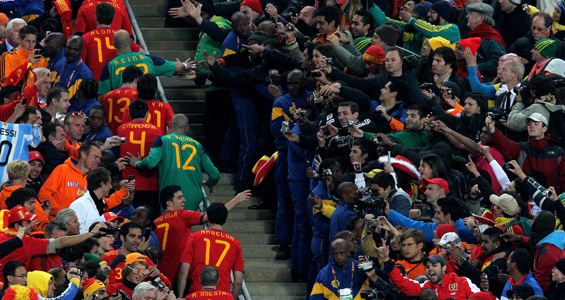South Africa delivers after doubts
Hosts reflect on successful tournament as Spain leave in triumph with trophy.

 |
| Spain mount the steps to collect the World Cup trophy at Soccer City [GALLO/GETTY] |
On a day when a victorious Spain and a defeated Netherlands make their way home, the pessismism that preceded Africa’s first World Cup seems a lifetime away after South Africa delivered on the biggest stage.
In the six years after the country won the right to stage the continent’s first tournament, organisers endured a sea of negative reports and plenty of domestic self doubt.
Keep reading
list of 4 itemsHolders Man City go out of Champions League on penalties to Real Madrid
Barca crash out as Mbappe brace leads PSG to Champions League last four
Saudi reviews football fan rules after whip attack
There were persistent suggestions that world governing body Fifa had a “Plan B” to move the tournament to Australia because of doubts over Africa’s capacity for such a vast logistical exercise.
Other reports said the stadiums would not be ready in time, fans and teams would be victims of South Africa’s frighteningly high rates of violent crime, that infrastructure would be incomplete and that transport would be a disaster.
With the exception of an embarrassing problem at Durban airport, where disorganisation prevented hundreds of irate fans landing to see the Spain-Germany semi-final, the country defied all these concerns.
Crime, the biggest bugbear, which did have an impact in reducing foreign visitors, has been virtually non-existent.
Unprecedented
So it is no surprise that South Africa is now basking in a glow of satisfaction and unprecedented self-confidence.
Chief organiser Danny Jordaan happily mocked the pessimists.
| SPECIAL COVERAGE |
 |
“Just stand in the corner and sulk. You are a small minority. We will just leave you in the corner,” he said.
President Jacob Zuma said the World Cup “has been a great success and will leave a lasting legacy in our country”.
Jordaan believes the tournament was the most important national event since the end of apartheid in 1994.
“It was a moment of special unity,” he said at the weekend.
It undoubtedly has brought people together in a country still troubled by racial divisions, as a stream of ecstatic callers to radio stations testified.
‘Joyful’
“I have never experienced anything like this joyful multi-racial exuberance in my life. Even the inauguration of Nelson Mandela … in 1994 pales into insignificance,” said a letter to the Star newspaper from reader Farouk Laher, perhaps somewhat over-exuberantly.
|
“Just stand in the corner and sulk. You (doubters) are a small minority. We will just leave you in the corner” Danny Jordaan, World Cup organiser |
It has also provided South Africa with a lasting legacy of roads, major infrastructure and especially transport to townships isolated under apartheid, which would probably not have been built for decades without the World Cup deadline.
Another major impact is the rebranding of Africa with a likely significant impact on investment and tourism.
“The long term impact is very important not just for South Africa but perhaps even more so for Africa,” said Frans Cronje, deputy director of the South African Institute for Race Relations.
“Having hundreds of millions of people focused on South Africa, focused on the good bits, the stadiums, the football the infrastructure; they have seen it is not just a jungle out there but these guys have roads and highways and electricity.”
Despite the general euphoria, there are still critics who say South Africa should not have spent more than $5 billion on the tournament when it still has an army of poor and unemployed, the world’s highest HIV caseload and myriad other problems.
Marcus Solomon, a social worker who spent a decade in the notorious Robben Island apartheid prison told the Reuters news agency: “They are spending so much money on one activity … and the time is over for its use now and all that money is wasted.”
But the critics have been muted.
Jack Lutaaya Kato, 22, a trader in Soweto township, complained he had made no money from the World Cup but added: “As Africans, we feel pride. In Europe, people did not know about South Africa. Now they have seen us in a good light.”
Forlan best player
There was not much good for the Netherlands after their late 1-0 defeat to Spain in the final on Sunday night but they will return home to a heroes’ welcome.
“The players will parade in a boat which will navigate the canals of Amsterdam. The tour will last between two and two and a half hours,” Guus Schoker, spokesman for the city of Amsterdam, told AFP on Monday.
The Oranje will then make their way to a specially-erected podium at the Museumplein in the city centre where 180,000 fans gathered on Sunday night to watch the final on a giant screen.
It was the third defeat in a World Cup final for the Netherlands after 1974 and 1978, and a first win for Spain.
Uruguay striker Diego Forlan also got some consolation after his team’s fourth-place finish by being named player of the tournament.
Forlan took 23.4 per cent in the “Golden Ball” poll organized by Fifa and voted for by journalists.
Dutch playmaker Wesley Sneijder was second and Spain’s David Villa third.
All three got five goals, making them joint top scorers along with Germany’s Thomas Muller.
Mueller took the “Golden Boot” award given to the top scorer, using assists and number of minutes played as a tie-breaker.
The German was also named Best Young Player.
As well as winning the World Cup, Spain also took the Fair Play Award.
Their captain Iker Casillas won the “Golden Glove” prize for best goalkeeper.